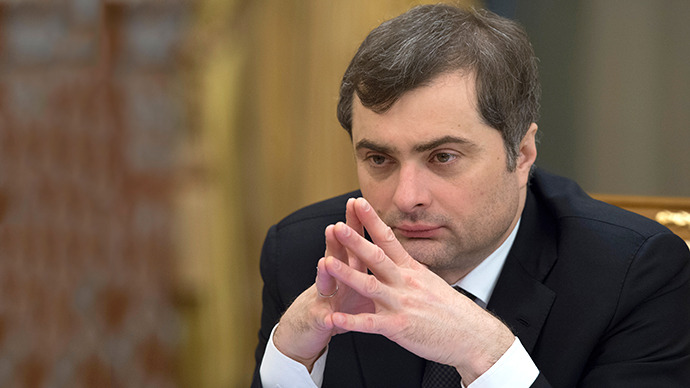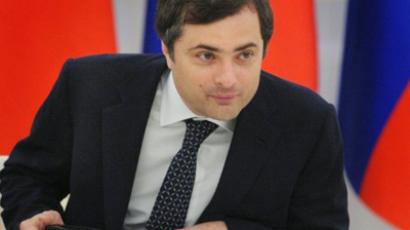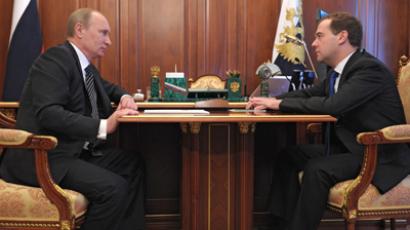Top politician, longtime Putin ally Surkov quits Cabinet

President Vladimir Putin has signed the voluntary resignation of deputy PM Vladislav Surkov, best known as the architect of Russia’s current political system – the ‘sovereign democracy.’
According to presidential press secretary Dmitry Peskov, Surkov’s resignation was connected to a Tuesday conference in which Putin chided government ministers for their slow progress implementing his 2012 decrees on long-term economic development. The president said at the conference that he was demanding personal accountability from top officials for their failures, but did not name anyone specifically.
Surkov told business daily Kommersant that he tendered his
resignation on April 26, but did not elaborate. He promised to
discuss his reasons later, “when it will be
appropriate.”
At the conference, Surkov delivered a report saying that the government’s performance was “flawless enough,” despite some difficulties. Russian media reported that the president agreed with this assessment.
Surkov became deputy PM in late December 2011. At the time, President Putin said that Surkov’s responsibilities in the Cabinet would be the modernization of education, science and healthcare, and the development of the GLONASS global satellite navigation system. In August 2012, Surkov was also tasked with overseeing religious issues in Russia.
However, Surkov rose to prominence long before his Cabinet appointment – in 1999, he began working as the deputy head of the presidential administration, and helped shape Russia’s internal politics. Surkov helped establish the current political system, described as ‘sovereign democracy,’ a phrase he personally coined.
The stated priorities of sovereign democracy are Russia’s national interests, as well as material prosperity and political freedom for all social and ethnic groups in the Russian Federation.
In recent years, Surkov advocated the development of a two-party system for Russia, saying that political competition was necessary for successful development. He recently raised the issue in his May 1 lecture at the London School of Economics, adding that the current Russian political system was “keeping up with society.”
During the same lecture, Surkov publicly challenged Russia’s top law enforcement agency, the Investigative Committee, by questioning investigators’ recent statements of graft schemes uncovered in Russia’s Skolkovo innovation fund.
The Investigative Committee is currently probing the Skolkovo fund for suspected graft after the organization’s executives paid a Lower House MP $750,000 for 10 lectures and one research paper.
Surkov headed a government group on developing the Skolkovo innovation hub, and sat on the fund’s board of trustees since 2010.
When presidential press secretary Peskov spoke of Surkov’s resignation, he stressed that the departure was not connected with this debate or with Skolkovo.
When asked about his future plans, Surkov told the Russkiy
Pioner magazine that they included writing.
"I have some plans. I have a plot for a political comedy based on real events ," the ex-official said.
Surkov already has some writing experience – it is widely believed that he wrote the novel ‘Near Zero’ under a pseudonym, as well as lyrics for a Goth rock band, a collaboration that resulted in two albums.
Hardliners and liberals argue about Surkov's real
reasons
Parliamentary majority party United Russia said they would offer Surkov a place in their staff if such a request were made. Deputy Secretary Dmitry Isayev told RIA Novosti that Surkov made the right decision when he tendered his resignation, adding that this should be “a lesson for everyone.”
Populist opposition party LDPR suggested that Surkov’s departure was caused by work stress and a desire to concentrate on his own projects. Igor Lebedev, the head of the party’s Supreme Council, praised Surkov’s role inside the Kremlin and said that all Russians should thank the politician for his work and wish him success in his new endeavors.
The head of non-parliamentary liberal party Yabloko, Sergey Mitrokhin, speculated that Surkov’s resignation was the Kremlin’s attempt to shore up the unity of the ruling political elite, and that Surkov’s recent speech in London had undermined this unity. Mitrokhin claimed that Surkov’s departure was forced in order to demonstrate how dissent is intolerable, Interfax news agency reported.
Other opposition and human rights activists also suggested that Surkov’s departure from the government was not voluntary. One of the leaders of liberal democratic party PARNAS, Boris Nemtsov, said that top Kremlin officials ousted Surkov because they now rely solely on law enforcement mechanisms to shape Russian politics.
The leader of the ‘For Human Rights’ movement, Lev Ponoimaryov said that the resignation was a “warning signal meaning that the law enforcers have won,” and that Surkov was a victim of the system he helped to create.
Political analyst Sergey Strokan has told RT that in his view, the resignation was a sign of changes that await Russia’s entire political structure.
“The main cause of Surkov's resignation is that he seems to have fallen out of the current configuration of powers and priorities that were outlined by Vladimir Putin in his third term in office. Despite Surkov's intellect and outstanding communicative skills, despite his enormous ability to find favor in the eyes of Vladimir Putin, his time is over. Putin has betted on both the other people and different style of governance in his third term,” Strokan said.
“It's not the last resignation in the power elite. There were people linked to Surkov and following his lead, they may have to quit now too,” the analyst added.
Deputy PM Arkadiy Dvorkovich was ordered to temporarily assume Surkov’s responsibilities before a new appointment is made, according to a statement on the government website.














